Leader of the Official Opposition (Canada)
The leader of the Official Opposition (French: chef de l'Opposition officielle), formally known as the leader of Her Majesty's Loyal Opposition (French: chef de la loyale opposition de Sa Majesté), is the politician who leads the Official Opposition in Canada, typically the leader of the party possessing the most seats in the House of Commons of Canada that is not the governing party or part of the governing coalition. The current Opposition leader is Erin O'Toole, who took office following his election as leader of the Conservative Party of Canada on August 24, 2020.
| Leader of Her Majesty's Loyal Opposition
Chef de la loyale opposition de Sa Majesté | |
|---|---|
| Official Opposition Parliament of Canada | |
| Style | The Honourable |
| Residence | Stornoway |
| Term length | While leader of the largest party not in government |
| Inaugural holder | Alexander Mackenzie |
| Formation | March 6, 1873 |
| Succession | 14th in order of precedence |
| Deputy | Candice Bergen |
| Salary | CA$269,800 (2020)[1] |
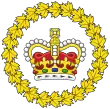 |
|---|
| This article is part of a series on the politics and government of Canada |
| Government (structure) |
|
|
Though the leader of the Opposition must be a member of the House of Commons,[2] the office should not be confused with the leader of the Opposition in the House of Commons, which is the formal title of the opposition house leader. There is also a leader of the Opposition in the Senate, who is usually of the same party as the leader of the Opposition in the house. If the leader of the opposition party is not a member of Parliament (MP), then a sitting MP takes the role of acting leader of the Opposition until the party leader can obtain a seat. Nine of officeholders have only served as an acting leader of the Opposition, including Deborah Grey (the first of three women to hold the position: Grey, Nycole Turmel and Rona Ambrose).
The leader of the Opposition is entitled to the same levels of pay and protection as a Cabinet minister and is often made a member of the Queen's Privy Council, generally the only non-government member of the House of Commons afforded that privilege. He or she is entitled to reside at the official residence of Stornoway and ranks fourteenth on the Order of Precedence, after Cabinet ministers and before lieutenant governors of the provinces. In the House of Commons seating plan, the leader of the Opposition sits directly across from the prime minister.
Two leaders of the Opposition have died in office: Wilfrid Laurier in 1919 and Jack Layton in 2011.[3]
Leaders of the Official Opposition
| Leader of the Opposition | Party | Took office[4] | Left office[4] | Prime Minister | |||
|---|---|---|---|---|---|---|---|
 |
Alexander Mackenzie 1st time |
Liberal | March 6, 1873 | November 5, 1873 | John A. Macdonald | ||
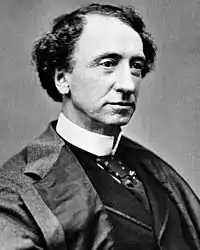 |
John A. Macdonald | Liberal-Conservative | November 6, 1873 | October 16, 1878 | Alexander Mackenzie | ||
 |
Alexander Mackenzie 2nd time |
Liberal | October 17, 1878 | April 27, 1880 | John A. Macdonald | ||
| vacant | Liberal | April 28, 1880 | May 3, 1880 | ||||
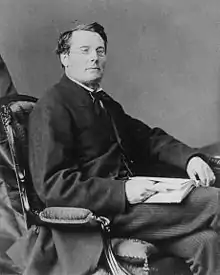 |
Edward Blake | Liberal | May 4, 1880 | June 2, 1887 | |||
| vacant | Liberal | June 3, 1887 | June 22, 1887 | ||||
 |
Wilfrid Laurier 1st time |
Liberal | June 23, 1887 | July 10, 1896 | |||
| John Abbott | |||||||
| John Sparrow David Thompson | |||||||
| Mackenzie Bowell | |||||||
| Charles Tupper | |||||||
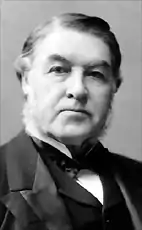 |
Charles Tupper[NB 1] | Conservative (historical) | July 11, 1896 | February 5, 1901 | Wilfrid Laurier | ||
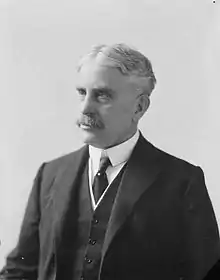 |
Robert Borden | Conservative (historical) | February 6, 1901 | October 9, 1911 | |||
 |
Wilfrid Laurier 2nd time |
Liberal | October 10, 1911 | February 17, 1919[NB 2] | Robert Borden | ||
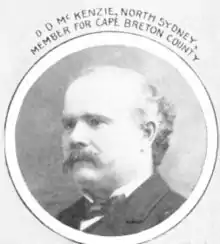 |
Daniel Duncan McKenzie (acting)[NB 3] | Liberal | February 17, 1919 | August 7, 1919 | |||
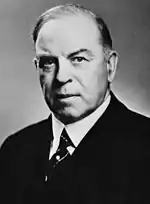 |
William Lyon Mackenzie King 1st time |
Liberal | August 7, 1919 | December 28, 1921 | |||
| Arthur Meighen | |||||||
 |
Arthur Meighen[NB 4] | Conservative (historical) | December 29, 1921 | June 28, 1926 | William Lyon Mackenzie King | ||
 |
William Lyon Mackenzie King 2nd time |
Liberal | June 29, 1926 | September 24, 1926 | Arthur Meighen | ||
| vacant[NB 5] | Conservative (historical) | September 25, 1926 | October 10, 1926 | William Lyon Mackenzie King | |||
| Hugh Guthrie[NB 6] | Conservative (historical) | October 11, 1926 | October 11, 1927 | ||||
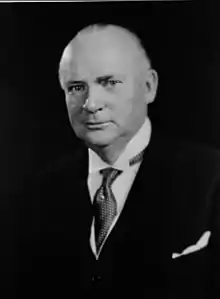 |
Richard Bedford Bennett 1st time |
Conservative (historical) | October 12, 1927 | August 6, 1930 | |||
 |
William Lyon Mackenzie King 3rd time |
Liberal | August 7, 1930 | October 22, 1935 | R. B. Bennett | ||
 |
Richard Bedford Bennett 2nd time |
Conservative (historical) | October 23, 1935 | July 6, 1938 | William Lyon Mackenzie King | ||
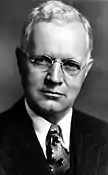 |
Robert Manion | Conservative (historical) | July 7, 1938 | May 13, 1940 | |||
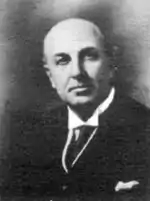 |
Richard Hanson[NB 7] | Conservative (historical), then Progressive Conservative[NB 8] |
May 14, 1940 | January 1, 1943 | |||
 |
Gordon Graydon[NB 9] | Progressive Conservative | January 1, 1943 | June 10, 1945 | |||
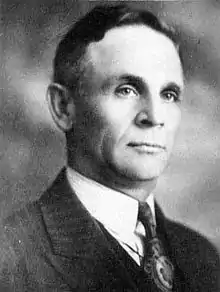 |
John Bracken | Progressive Conservative | June 11, 1945 | July 20, 1948 | |||
| vacant | Progressive Conservative | July 21, 1948 | October 1, 1948 | ||||
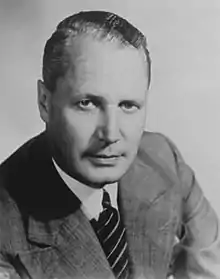 |
George A. Drew 1st time |
Progressive Conservative | October 2, 1948 | November 1, 1954 | |||
| Louis St. Laurent | |||||||
 |
William Earl Rowe (acting)[NB 10] 1st time |
Progressive Conservative | November 1, 1954 | February 1, 1955 | |||
 |
George A. Drew 2nd time |
Progressive Conservative | February 1, 1955 | August 1, 1956 | |||
 |
William Earl Rowe 2nd time |
Progressive Conservative | August 1, 1956 | December 13, 1956 | |||
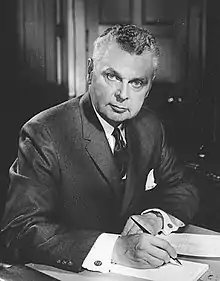 |
John George Diefenbaker 1st time |
Progressive Conservative | December 14, 1956 | June 20, 1957 | |||
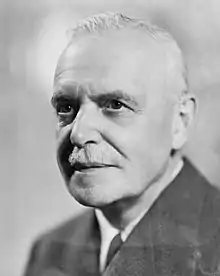 |
Louis St. Laurent | Liberal | June 21, 1957 | January 15, 1958 | John Diefenbaker | ||
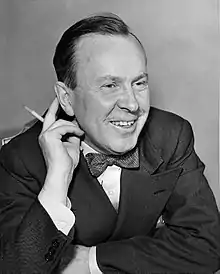 |
Lester B. Pearson | Liberal | January 16, 1958 | April 21, 1963 | |||
 |
John George Diefenbaker 2nd time |
Progressive Conservative | April 22, 1963 | September 8, 1967 | Lester B. Pearson | ||
| Michael Starr[NB 11] | Progressive Conservative | September 9, 1967 | November 5, 1967 | ||||
| Robert Stanfield | Progressive Conservative | November 6, 1967 | February 21, 1976 | ||||
| Pierre Trudeau | |||||||
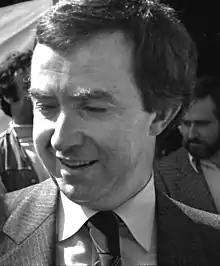 |
Joe Clark 1st time |
Progressive Conservative | February 22, 1976 | June 3, 1979 | |||
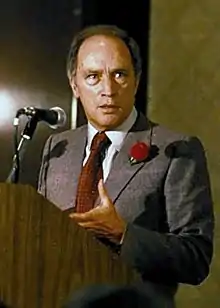 |
Pierre Elliott Trudeau | Liberal | June 4, 1979 | March 2, 1980 | Joe Clark | ||
 |
Joe Clark 2nd time |
Progressive Conservative | March 3, 1980 | February 1, 1983 | Pierre Trudeau | ||
 |
Erik Nielsen[NB 12] | Progressive Conservative | February 2, 1983 | August 28, 1983 | |||
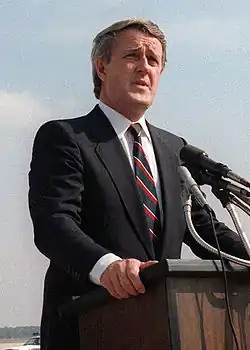 |
Brian Mulroney | Progressive Conservative | August 29, 1983 | September 16, 1984 | |||
| John Turner | |||||||
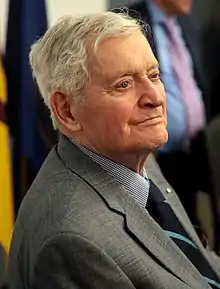 |
John Turner | Liberal | September 17, 1984 | February 7, 1990 | Brian Mulroney | ||
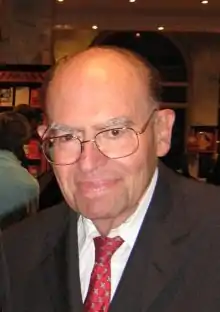 |
Herb Gray (acting)[NB 13] | Liberal | February 8, 1990 | December 20, 1990 | |||
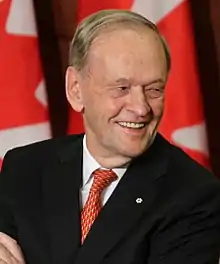 |
Jean Chrétien | Liberal | December 21, 1990 | October 24, 1993 | |||
| Kim Campbell | |||||||
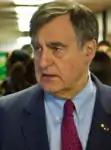 |
Lucien Bouchard | Bloc Québécois | October 25, 1993 | January 14, 1996 | Jean Chrétien | ||
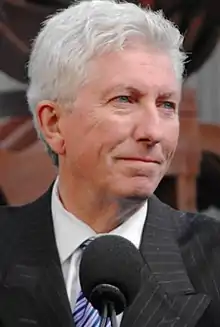 |
Gilles Duceppe[NB 14] 1st time |
Bloc Québécois | January 15, 1996 | February 16, 1996 | |||
.jpg.webp) |
Michel Gauthier | Bloc Québécois | February 17, 1996 | March 14, 1997 | |||
 |
Gilles Duceppe 2nd time |
Bloc Québécois | March 15, 1997 | June 1, 1997 | |||
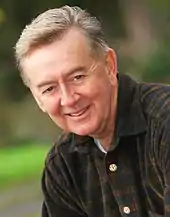 |
Preston Manning | Reform | June 2, 1997 | March 26, 2000 | |||
 |
Deborah Grey[NB 15] | Canadian Alliance | March 27, 2000 | September 10, 2000 | |||
.jpg.webp) |
Stockwell Day | Canadian Alliance | September 11, 2000 | December 11, 2001 | |||
| John Reynolds[NB 16] | Canadian Alliance | December 12, 2001 | May 20, 2002 | ||||
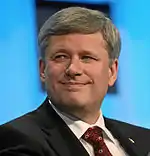 |
Stephen Harper 1st time |
Canadian Alliance | May 21, 2002 | January 8, 2004 | |||
| Paul Martin | |||||||
 |
Grant Hill[NB 17] | Canadian Alliance | January 9, 2004 | February 1, 2004 | |||
| Conservative | February 2, 2004[NB 18] | March 19, 2004 | |||||
 |
Stephen Harper 2nd time |
Conservative | March 20, 2004 | February 5, 2006 | |||
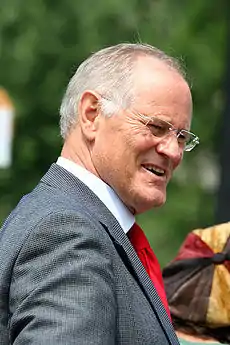 |
Bill Graham[NB 19] | Liberal | February 6, 2006 | December 1, 2006 | Stephen Harper | ||
| Stéphane Dion | Liberal | December 2, 2006 | December 9, 2008 | ||||
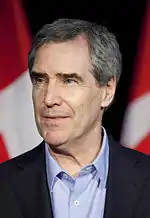 |
Michael Ignatieff[NB 20] | Liberal | December 10, 2008 | May 1, 2011 | |||
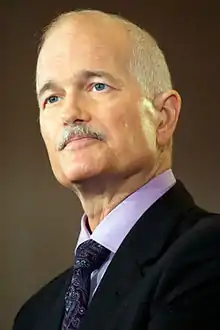 |
Jack Layton | New Democratic | May 2, 2011 | August 22, 2011[NB 2] | |||
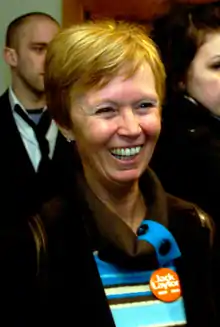 |
Nycole Turmel[NB 21] | New Democratic | August 23, 2011 | March 23, 2012 | |||
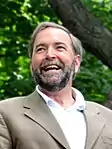 |
Thomas Mulcair | New Democratic | March 24, 2012 | November 4, 2015 | |||
_(cropped).jpg.webp) |
Rona Ambrose[NB 22] | Conservative | November 5, 2015 | May 27, 2017 | Justin Trudeau | ||
.jpg.webp) |
Andrew Scheer | Conservative | May 27, 2017 | August 24, 2020 | |||
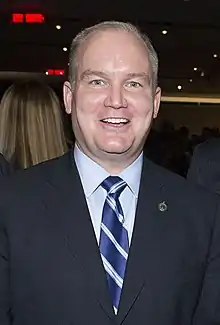 |
Erin O'Toole | Conservative | August 24, 2020 | Incumbent | |||
Deputy leaders of the Opposition
| Deputy Leader of the Opposition | Took office | Left office | Leader |
|---|---|---|---|
| Denis Lebel[5] | November 19, 2015 | July 23, 2017 | Rona Ambrose |
| Lisa Raitt[6] | July 24, 2017 | October 21, 2019 | Andrew Scheer |
| Leona Alleslev[7] | November 28, 2019 | July 12, 2020 | Andrew Scheer |
| Candice Bergen[8][9] | September 2, 2020 | Incumbent | Erin O'Toole |
Official Opposition Shadow Cabinet
The Official Opposition Shadow Cabinet in Canada is composed of members of the main opposition party, Her Majesty's Loyal Opposition, and is responsible for holding the Government to account and for developing and disseminating the party's policy positions. Members of the official opposition are generally referred to as opposition critics, but the term Shadow Minister (which is generally used in other Westminster systems) is also used.
Notes
- Tupper lost his seat in the 1900 election and resigned as party leader and Leader of the Opposition three months later.
- Died in office.
- McKenzie served as Leader of the Opposition from Laurier's death until King's election as leader of the Liberal Party.
- Arthur Meighen's Conservatives formed the Official Opposition although the Progressive Party had more seats.
- Meighen failed to win his seat and immediately resigned as leader of the Conservative Party.
- Guthrie served as Leader of the Opposition from shortly after Meighen's resignation until Bennett's election as leader of the Conservative Party.
- Hanson served as Leader of the Opposition from Manion's resignation until Meighen's election as leader of the Conservative Party. He continued as acting Leader of the Opposition throughout Meighen's term as Conservative leader, as Meighen failed in his attempts to win election to the House of Commons, and continued as acting Leader of the Opposition from Bracken's election as PC leader until his own resignation.
- The Conservative Party was renamed the Progressive Conservative Party in 1942.
- Graydon served as Leader of the Opposition from Hanson's resignation until Bracken entered Parliament in the 20th general election.
- Rowe served as acting Leader of the Opposition in winter 1954-55 due to Drew's poor health.
- Starr served as Leader of the Opposition from Stanfield's election as PC leader until Stanfield entered Parliament via by-election.
- Nielsen served as acting Leader of the Opposition for the two weeks preceding Clark's resignation from the post of leader of the PC Party. He continued as Leader of the Opposition during the 1983 Progressive Conservative leadership campaign in which Clark unsuccessfully ran to succeed himself. Nielsen continued as Leader of the Opposition from Mulroney's election as PC leader until Mulroney entered Parliament via by-election.
- Gray served as parliamentary leader of the Liberal Party from John Turner's announcement that he would be stepping down through Chrétien's election as Liberal leader and until Chrétien entered Parliament via by-election.
- Duceppe served as Leader of the Opposition during the 1996 Bloc Québécois leadership election initiated by Bouchard's sudden resignation from federal politics to become Premier of Quebec.
- Grey served as Leader of the Opposition during the 2000 Canadian Alliance leadership campaign in which Manning unsuccessfully ran to succeed himself. She continued as Leader of the Opposition from Day's election as Alliance leader until Day entered Parliament via byelection.
- Reynolds served as Leader of the Opposition during the 2002 Canadian Alliance leadership campaign in which Day unsuccessfully ran to succeed himself. He continued as Leader of the Opposition from Harper's election as Alliance leader until Harper entered Parliament via by-election.
- Hill served as Leader of the Opposition during the 2004 Conservative leadership election in which Harper successfully ran to be leader of the new party.
- Although the PC Party and Canadian Alliance were recognized as merged on December 7, 2003, by Elections Canada, they did not merge their parliamentary caucuses until February 2, 2004.
- Graham served as interim parliamentary leader and Leader of the Opposition until the 2006 Liberal leadership convention.
- Ignatieff served as interim Leader of Liberal Party until being elected Leader in the 2009 Liberal leadership convention.
- Turmel became interim leader of the NDP on July 28, 2011, when Layton began his leave of absence, but she did not become the Leader of the Opposition until Layton's death.
- Ambrose was elected interim party leader by the Conservative caucus to serve until a permanent leader was elected at the 2017 Conservative Party of Canada leadership election.
References
- "Indemnities, Salaries and Allowances". Parliament of Canada. Parliament of Canada. Retrieved 13 July 2020.
- Role of Opposition Parties in Canada, Compendium of Procedure, House of Commons of Canada.
- McGregor, Janyce (August 22, 2011). "Parliament and Layton's passing". CBC News. Retrieved August 23, 2011.
- Parliament of Canada. "Leaders of the Official Opposition". Retrieved March 27, 2012.
- "Roles - Hon. Denis Lebel". Parliament of Canada. Retrieved 8 September 2020.
- "Roles - Hon. Lisa Raitt". Parliament of Canada. Retrieved 8 September 2020.
- Jones, Ryan Patrick (13 July 2020). "Leona Alleslev steps down as Conservative deputy leader, backs MacKay's leadership bid". CBC News. Retrieved 8 September 2020.
- "Roles - Hon. Candice Bergen". Parliament of Canada. Retrieved 8 September 2020.
- "O'Toole names top Tories for Commons roles, with Bergen as deputy leader". Kamloops This Week. Retrieved 2020-09-02.